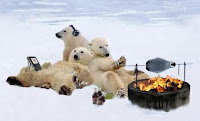 Back in early 2008, Gov. Timothy M. Kaine launched a commission to study the impact of Global Warming on Virginia. “Gone are the days of debating whether man-made effects exist,” he said. “Those days are gone.”
Back in early 2008, Gov. Timothy M. Kaine launched a commission to study the impact of Global Warming on Virginia. “Gone are the days of debating whether man-made effects exist,” he said. “Those days are gone.”
Well, it turns out those days are back. And one of the central figures in reopening the debate is none other than Patrick Michaels, the environmental scientist and former state climatologist whom Kaine defrocked from his post. (I covered these events when they happened. Type “Patrick Michaels” into the search box to read my commentary.)
In what is fast exploding into the greatest scientific scandal of the decade, a large volume of email correspondence and other documents have been either hacked or leaked from the Climate Research Unit (CRU) at the East Anglia University in the United Kingdom. The CRU is the keeper of the world’s most extensive data files tracking temperatures across the globe and back in time. Its data formed the basis for the United Nation’s 2007 Intergovernmental Panel on Climate Change, the report before which anthropogenic Global Warming advocates bow, scrape and genuflect as holy writ.
The hacked/leaked emails contain extraordinary material suggesting that the keepers of the data massaged the data until it yielded the results they wanted, stonewalled Freedom of Information Act requests to access the data, and sought to marginalize Global Warming skeptics by keeping them out of peer refereed scientific journals. It’s as if an archaeologist had stumbled across a cave in the Holy Land and unearthed documents proving that ancient scribes had tampered with the Gospel of Mark to support their theological views.
One of the most vilified figures in the email correspondence is none other than Patrick Michaels, a leading skeptic of human-caused Global Warming. As one of the GW high priests said, “Next time I see Pat Michaels at a scientific meeting, I’ll be tempted to beat the crap out of him.”
The CRU has put out the story that its computers were hacked, thus casting a pall of illegitimacy upon those who would use the documents to criticize the institute, but it’s entirely possible that they were leaked. In truth, the story has been brewing for a long time. In September, Michaels wrote a column in National Review, “The Dog Ate Global Warming,” in which he described the lengthy and unsuccessful efforts over several years of GW skeptics to obtain the CRU’s data . CRU officials gave a variety of reasons for refusing to cooperate. Then one of them confided to a University of Colorado scientist:
Since the 1980s, we have merged the data we have received into existing series or begun new ones, so it is impossible to say if all stations within a particular country or if all of an individual record should be freely available. Data storage availability in the 1980s meant that we were not able to keep the multiple sources for some sites, only the station series after adjustment for homogeneity issues. We, therefore, do not hold the original raw data but only the value-added (i.e., quality controlled and homogenized) data.
Apparently, he wasn’t far off the mark. One of the most damaging of the 3,600 documents revealed in what the blogs are calling Climategate is one entitled “HARRY_READ_ME.txt” composed by an unknown computer programmer (presumably named Harry) who spent three years trying to debug the computer code at the core of the CRU’s climate model. Declan McCullagh with CBS, who has done the best MSM reporting I’ve read so far, reports some of the more damaging statements regarding how the database incorporated data from temperature reading stations:
I am seriously worried that our flagship gridded data product is produced by Delaunay triangulation – apparently linear as well. As far as I can see, this renders the station counts totally meaningless. … I am very sorry to report that the rest of the databases seem to be in nearly as poor a state as Australia was. There are hundreds if not thousands of pairs of dummy stations. … There truly is no end in sight… So, we can have a proper result, but only by including a load of garbage! …
One thing that’s unsettling is that many of the assigned WMo codes for Canadian stations do not return any hits with a web search. … Makes me wonder if these are long-discontinued, or were even invented somewhere other than Canada! …
Knowing how long it takes to debug this suite – the experiment endeth here. The option (like all the anomdtb options) is totally undocumented so we’ll never know what we lost. … Right, time to stop pussyfooting around the niceties of Tim’s labyrinthine software suites – let’s have a go at producing CRU TS 3.0! since failing to do that will be the definitive failure of the entire project. …
Ulp! I am seriously close to giving up, again. The history of this is so complex that I can’t get far enough into it before my head hurts and I have to stop. Each parameter has a tortuous history of manual and semi-automated interventions that I simply cannot just go back to early versions and run the update prog. …


